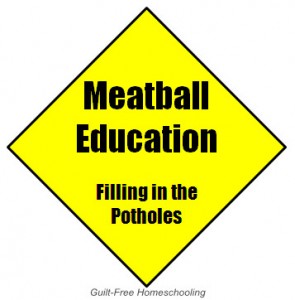Some of you are wishing you could pull your children out of the classrooms they’re already in, but feel that would be too difficult or traumatic. Fiddlesticks. Adjusting from an organized school system to homeschooling does take time and effort, but it is well worth it. I remember hearing somewhere that I should expect an average of one month of homeschooling to adjust for every year of public school — double that if the child attended preschool. My daughter had attended 5 years of public school (K through 4th) plus preschool, making for about a 12-month adjustment period to homeschooling. In her case, that was very accurate. By the beginning of our second year of homeschooling, she was “in the groove” and loving it.
The adjustment was rocky at first for all of us, but grew easier with time. I had never homeschooled children before, but they had never been homeschooled before either, so we were breaking new ground together. Many times we cuddled together and cried together and vowed to get through this together. We changed methods, we changed books, we kept trying new things until we found the things that worked.
So if you do pull your children out of public school, then what? You are thinking that you cannot fix the potholes in their education until they will recognize you as their teacher; you cannot get them to recognize you as their teacher until you can prove yourself by teaching them; you cannot teach them until you can fix the potholes in their education.
A magical transformation takes place on your first day of homeschooling: Student asks a question, and Mom gives the answer. Suddenly Mom is seen as Teacher. Student recognizes that Mom knows stuff. Occasionally, Mom may not know the answer, but Smart Mom will reply, “Let’s find the answer together.” And an exercise in research skills is begun. There is no crime in reading the answer out of the teacher’s manual or answer book — that is why you bought it! (Only purchase those for the subjects in which you really need them — hopefully not for 2nd grade reading.)
I am a die-hard fan of reruns of the old TV show M*A*S*H, in which the surgeons performed what they referred to as “meatball surgery.” They saved their patients lives, then sent them on their way to another hospital for more complete care. As homeschoolers, we often have to do a similar thing, patching up the missed portions of education, so that the rest of the child’s education can be furthered. If you have brought your students back home from government school, you will find potholes. There is just no way to keep a classroom of 30 students moving along without dragging a few along the way. Even if your student was the brightest in the class, he probably got bored waiting for the others to catch up and missed something. That is a pothole. Meatball Education fills in those potholes.
You will start homeschooling and be sailing along, gaining momentum, until one day — BAM — out of nowhere you fall into a pothole. We found potholes called “fractions” and “decimals” and “using commas in a series” and even “how to pronounce the word ‘a’.” A pothole means that you have to put your current lesson aside and fill in the missing part before you can proceed. Try some of these lines to help you and your students get through the potholes and back out the other side:
“I’m not just your mom, I’m your teacher; but I’m not just your teacher, I’m your mom.”
“Love comes free with the education. One free hug with each question asked.”
“You can sit on my lap while we do this particularly difficult lesson.”
Do not be discouraged — finding a pothole simply means you are educating. Look upon potholes as merit badges: I have found another one; I am filling in the gaps in my student’s education.





 Guilt-Free Homeschooling is the creation of Carolyn Morrison and her daughter, Jennifer Leonhard. After serious disappointments with public school, Carolyn spent the next 11 years homeschooling her two children, from elementary to high school graduation and college admission. Refusing to force new homeschooling families to re-invent the wheel, Carolyn and Jennifer now share their encouragement, support, tips, and tricks, filling their blog with "all the answers we were looking for as a new-to-homeschooling family" and making this website a valuable resource for parents, not just a daily journal. Guilt-Free Homeschooling -- Equipping Parents for Homeschooling Success!
Guilt-Free Homeschooling is the creation of Carolyn Morrison and her daughter, Jennifer Leonhard. After serious disappointments with public school, Carolyn spent the next 11 years homeschooling her two children, from elementary to high school graduation and college admission. Refusing to force new homeschooling families to re-invent the wheel, Carolyn and Jennifer now share their encouragement, support, tips, and tricks, filling their blog with "all the answers we were looking for as a new-to-homeschooling family" and making this website a valuable resource for parents, not just a daily journal. Guilt-Free Homeschooling -- Equipping Parents for Homeschooling Success!

Recent Comments